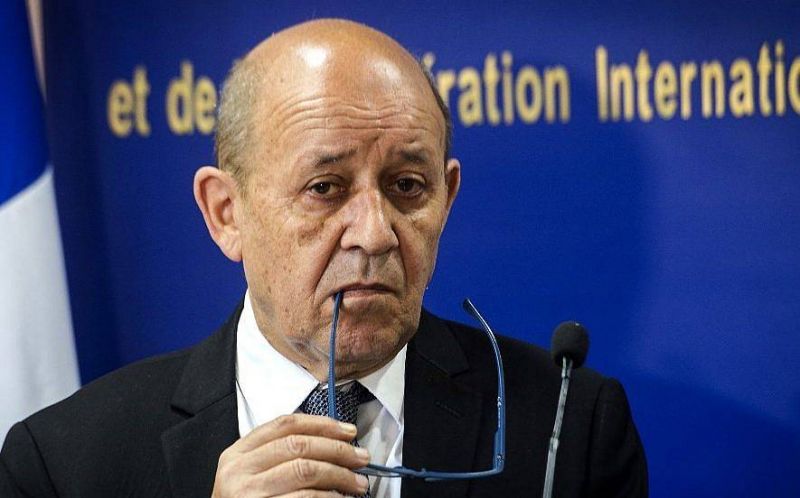
French Foreign Minister Jean-Yves Le Drian is expected to push Lebanese leaders on cabinet formation and reforms during his visit. (Credit: Fadel Senna/AFP)
Want to get the Morning Brief by email? Click here to sign up.
France’s foreign minister vowed to send a “message of great firmness” to Lebanese figures blocking cabinet formation. Jean-Yves Le Drian, who is visiting Beirut today, tweeted his intention to put pressure on the country’s political leaders to overcome the obstacles to government formation. His comments come days after France announced entry restrictions on certain Lebanese politicians as a sanction for their role in the government formation deadlock, without specifying against whom the measures were being taken. The French minister yesterday described these sanctions as “just the start.” Le Drian is reportedly set to meet with President Michel Aoun and Parliament Speaker Nabih Berri.
Électricité du Liban power plants will begin to cease operating from May 18 if the state monopoly doesn’t secure funds to buy fuel. Parliament’s energy committee head, Nazih Najem, said that the caretaker energy minister informed him that the Zouk power plant would stop operating from May 18, while the Jiyyeh and Zahrani power plants would close from June 6 and June 8 respectively, if EDL does not receive funding. News of the anticipated closures follows a Constitutional Council decision on Tuesday to block a $200 million treasury advance to purchase fuel after a group of MPs rejected the dip into the central bank’s mandatory reserves, which they say the advance would necessitate. For decades, the treasury has been providing EDL with advances to cover chronic budget deficits.
Public Financial Prosecutor Ali Ibrahim ordered that Turkish electricity-generating barges be prevented from leaving Lebanese shores. The finance and energy ministries and the security forces were informed by Court of Cassation Advocate-General Ghassan Khoury of an order from the financial prosecutor to seize the Turkish power barges and stop them leaving, state media reported. The order relates to millions of dollars of illicit commissions allegedly paid between the Energy Ministry and Karpowership, a Turkish company that operates power barges, which were revealed by an Al-Jadeed TV investigation. The state’s contract with the company forbids the receipt of commissions. While the state seeks verification that commissions were paid — which could lead to Karpowership incurring a $25 million penalty — Khoury asked the Finance Ministry to stop settling any dues owed to the Turkish company.
A boat loaded with 59 containers of dangerous chemicals left Beirut’s port. Combi Lift, the German company contracted to dispose of toxic waste discovered at the port in the wake of the Aug. 4 explosion, shipped 59 containers of dangerous materials to Germany, Andreas Kindl, the German ambassador to Lebanon, tweeted yesterday. The chemicals have been stored and safely packed in the port since March, but government delays in opening a letter of credit to pay Combi Lift slowed their departure.
Parliamentarians plan to send a Lebanese delegation to Saudi Arabia to address the kingdom’s ban on Lebanese agricultural produce, once practical steps to combat smuggling have been taken. Following a meeting of Parliament’s economy and trade committee, its head Farid Boustany said that the committee plans to send a delegation to Saudi Arabia to address the kingdom’s suspension of Lebanese produce imports following the discovery last month of more than 5 million pills of the amphetamine Captagon hidden inside a shipment of pomegranates. Caretaker Interior Minister Mohamed Fehmi asked “friendly countries” to help purchase scanners to inspect goods at its ports and at the border with Syria, while Boustany suggested the private sector could play a role in obtaining and operating the machines.
Today, Martyrs’ Day, commemorates Lebanese and Syrian nationalists executed between 1915 and 1916 by the Ottoman Empire. They were executed in both the Marjeh Square in Damascus and Burj Square in Downtown Beirut, which in 1931 was renamed Martyrs’ Square in their honor.